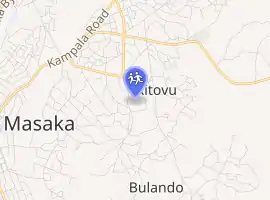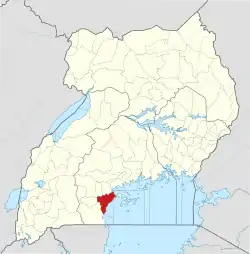St. Henry's College Kitovu
St. Henry's College Kitovu (SHACK), is a boys-only government-aided boarding middle and high school in Uganda, the third-largest economy in the East African Community.
| St. Henry's College Kitovu | |
|---|---|
| Location | |

| |
| , | |
| Information | |
| Type | Public Middle School and High School |
| Motto | "For Greater Horizons'' |
| Established | 1922 |
| Headteacher | Brother Augustine Mugabo |
| Number of students | 1,010 |
| Nickname | SHACK |
| Website | Homepage |
Location
The school campus is located on Kitovu Hill, elevation:1,300 metres (4,300 ft), situated in the eastern suburbs of the city of Masaka in Masaka District, the Central Region of Uganda. This is approximately 7 kilometres (4.3 mi), by road, south-east of the central business district of Masaka.[1] Kitovu is approximately 140 kilometres (87 mi), by road, south-west of Kampala, the capital and largest city of Uganda.[2] The coordinates of the campus are 0°20'04.0"S, 31°45'44.0"E (Latitude:-0.334444; Longitude:31.762222).[3]
Overview
The college was founded by the White Fathers in 1922. It lies about 3 kilometres (1.9 mi), by road, from the suburb of Nyendo, atop the Kitovu Hill near the Kitovu Catholic Cathedral. The main school campus covers a large expanse of land. The School has a population of over 1,000 students.[4]
History
The beginning
In September 1922, Adrian Laberge, a Canadian missionary of the White Fathers and a disciple of Cardinal Lavigerie, founded the school. The pioneer students came from the Lubaga School, which was also under the direction of the White Fathers. The beginnings were very humble, with three simple buildings of sun-dried bricks serving as classrooms and dormitories. The new institution was blessed by Bishop Henry Streicher, and it was placed under the protection of Saint Henry, patron of the Vicar Apostolic of Uganda.
During the next five years, the school was led by Father Laberge, with the help of Damasus Mukasa and the help of some other local men. The good progress of the school attracted the attention of the religious and civil authorities, increasing its profile. As it grew, the school needed more land for expansion. Ignatius Lule of Nyendo offered his land on top of Kitovu Hill. Charles Jules Poitras, founder and Superior of the Brothers in Uganda, visited the school accompanied by Joachim Leo Collerette. They were impressed by what they saw, and gave a positive report. In August 1927, Eugene Paquette and Donat Trudel assumed leadership at Kitovu, working closely with Paul Kigozi and Stephen Kayongo. In 1936, the Education Department reshuffled the country's system of education and Kitovu was transformed into a junior secondary school. At that time, St. Henry's School had 95 pupils, in four classes.[5]
The middle years
The period between 1950 and 1960 saw the college standing on a firm footing in the Cambridge Certificate course. This, however, was not achieved without difficulties, for the growth required new classrooms, an upgraded library, laboratories, and dormitories. After careful consideration, the authorities decided that St. Henry's should be permitted to stand on equal terms and share the same privileges as other schools of the same footing in the country. In 1969, the Higher School Certificate course was introduced. The result was that, by 1972, the year of St. Henry's Golden Jubilee, the school population had passed the 1,000 resident students, with over 80 buildings spread over the large campus.
Reputation
In 2006, the college produced the top eight "O" Level graduates in the Masaka District.[6]
Academics
A variety of science and arts subjects is offered. The school has both ordinary ("O") and advanced ("A") levels. The ordinary level is for four years, from senior one to senior four while the Advanced level is for two years, from senior five to senior six.
Subjects offered at "O" Level include biology, chemistry, Christian religious education, entrepreneurship, commerce, computer studies, English language and literature, fine art, French, geography, history, mathematics, physics, and technical drawing.
At "A" level, the arts and sciences subjects offered are history, economics, divinity, French, literature in English, geography, and fine art. The science subjects offered are physics, chemistry, mathematics, biology, and technical drawing. Subsidiary mathematics and general paper are compulsory subjects and students are required to choose one to offer with their three chosen Arts or Sciences subjects.[7]
Houses of residence
The College has twelve houses of residence. They are in two sections of the houses of residence. One is referred to as “Gutter”, housing mainly S.1 to S.2 students,the other, “California”, housing mainly S.3 to S.4, and lastly "Washington DC" S.5 to S.6 students.[8]
- Gutter
- Laberge
- Kizito
- Muteesa
- Mugwanya
- Kiwanuka
- Eugene
- California
- Buddu I
- Buddu II
- Mukudde I
- Mukudde II
- Kyewalyanga I
- Kyewalyanga II
- Washington DC
- Block A
- Block B
Prominent alumni
The following are prominent alumni of the school.
Politicians
- Benedicto Kiwanuka
- Paul Ssemogerere
- Ken Lukyamuzi
- John Byabagambi
- Elly Tumwine
- Faustin Kayumba Nyamwasa
Lawyers
Academics
Bankers and accountants
Musicians
- Ragga Dee
- Nubian Lee
Sportsmen
Writers
Others
References
- "Road Distance Between Masaka And Kitovu With Map". Globefeed.com. Retrieved 23 July 2014.
- "Map Showing Kitovu And Kampala With Distance Marker". Globefeed.com. Retrieved 23 July 2014.
- Google. "Location of St. Henry's College Kitovu At Google Maps". Google Maps. Retrieved 23 July 2014.
- Ssali, Michael (18 July 2007). "Uganda: St. Henry's College Kitovu Marks 85 Years of Excellence". Daily Monitor VIA AllAfrica.com. Retrieved 23 July 2014.
- Ssali, Michael (21 May 2012). "St. Henry's Kitovu: Unlike The Country, The School Has Avoided Much of The Turbulent Past". Daily Monitor. Retrieved 23 July 2014.
- Newvision, Archive (10 February 2007). "List of Best O-Level Results per District". New Vision. Retrieved 23 July 2014.
- Kiwuuwa, Paul (3 March 2008). "Dream Comes True for Kitovu Student". New Vision. Archived from the original on 8 August 2014. Retrieved 23 July 2013.
- Nalubwama, Jackie (9 November 2006). "Enduring Art, Sport At St. Henry's Kitovu". The Observer (Uganda). Retrieved 23 July 2014.
